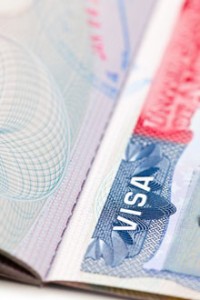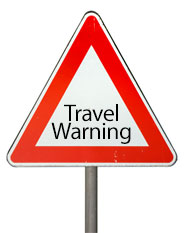J1 Visa Insurance Plans
May 6th, 2013 by Ross Mason If you are looking to come to the USA, the J1 visa is one of the more common visa categories that will let you work, study and spend up to 1 year (possibly more depending on the program) in the USA. The J1 visa is a student visa, so its not available to everyone, but offers you the opportunity to become an exchange visitor as either a short-term scholar, au pair, intern, camp counselor, international visitor or under the work and travel program. For more detailed information about the J1 visa, please see our full explanation of “What is a J1 visa” to learn more about all the categories in more detail.
If you are looking to come to the USA, the J1 visa is one of the more common visa categories that will let you work, study and spend up to 1 year (possibly more depending on the program) in the USA. The J1 visa is a student visa, so its not available to everyone, but offers you the opportunity to become an exchange visitor as either a short-term scholar, au pair, intern, camp counselor, international visitor or under the work and travel program. For more detailed information about the J1 visa, please see our full explanation of “What is a J1 visa” to learn more about all the categories in more detail.
Each year over 170,000 students come to the USA on the J1 visa, making it one of the larger visa programs and it is immensely popular. To start the process of applying for a J1 visa, you will need to first find a sponsor who will guide you through the whole process – there is a full list of designated J1 visa sponsors on the US State Departments website and it is highly recommended that you only contact one of the approved sponsors first who will guide you in the right direction.
As part of the application process, you will need to attend a J1 Visa Interview where the immigration officer will ask you a range of questions about the program you will be undertaking. One of the biggest points to remember is that the J1 visa is a short term visa, and not designed to be a visa for long term stays in the USA. Therefore during your interview you will most likely be asked about your plans while in the USA and will probably need to show proof that you will return home after your program.
Also as part of your visa application, and an integral part of any travel experience, you will need to show proof of health insurance coverage. J1 visa insurance plans are very common, and in most cases your sponsor should help you find the right plan for you. If this is not the case, or you prefer to locate your own insurance coverage there are certain levels of coverage you will need to meet as outlined in our health insurance requirements for the J1 visa article. This comprehensive article outlines all the coverage and benefit limits you need to meet.
If you need assistance with locating coverage, or have questions about the J1 insurance requirements please do not hesitate to contact us for more information as we are more than happy to assist you.
May 2013 Travel Warning
May 3rd, 2013 by Bryanna Davis The May 2013 travel warning shows the warnings posted throughout the month of April by the U.S. State Department. If you will be traveling please ensure that you are aware of the current situation within your host country and you follow the May 2013 travel warning safety suggestions accordingly.
The May 2013 travel warning shows the warnings posted throughout the month of April by the U.S. State Department. If you will be traveling please ensure that you are aware of the current situation within your host country and you follow the May 2013 travel warning safety suggestions accordingly.
Travel Warning in Lebanon- Issued April 1, 2013: U.S. citizens are urged to avoid all travel to Lebanon. The risk of spontaneous violence- including kidnappings within Lebanon remains high. Additionally, the ability for U.S. governmental personnel to reach those in need is very limited.
Travel Warning in Pakistan- Issued April 9, 2013: A warning for travel to Pakistan remains in effect. It is warned that all U.S. citizens postpone non-essential travel to Pakistan since there are still frequent terrorist attacks against civilian, government and foreign targets. Additionally, terrorists seek to attack locations where westerners are known to visit.
Travel Warning in Colombia- Issued April 11, 2013: The Department of State reports there are thousands of U.S. citizens that safely visit Colombia each year. While U.S. citizens are not specifically targeted due to their nationality, they are still advised to be cautious as narco-trafficking continues to affect the safety of visitors.
Travel Warning in Sudan- Issued April 16, 2013: U.S. Citizens are advised to avoid all travel to the Darfur region of Sudan, Blue Nile and the Southern Kordofan states and to be cautious in other areas of Sudan. Both local and international news should be monitored closely while traveling anywhere in Sudan.
Travel Warning in Burundi- Issued April 22, 2013: This travel warning is to replace the warning issued November 8, 2012 and to reiterate the dangers of travel within Burundi and that the security restriction on embassy personnel is still active. U.S. individuals may also be of particular target for terrorist attack.
Travel Warning in Democratic Republic of the Congo- Issued April 24, 2013: Due to the ongoing instability and violence, travel to the city of Goma and the province of North Kivu is strongly advised to be avoided in non-essential situations. Additionally, it is important to be aware that U.S. governmental personnel services to U.S. citizens is extremely limited within this country.
While traveling, please keep these May 2013 travel warnings in mind. Additionally, travelers are advised to enroll through the U.S. Department of State’s Smart Traveler Enrollment Program (STEP) to stay up to date on travel security information.
Health Insurance for International Students at Palm Beach State College
April 26th, 2013 by Bryanna Davis The following insurance plan is accepted by Palm Beach State College, review the plan and enroll right online.
The following insurance plan is accepted by Palm Beach State College, review the plan and enroll right online.
Many colleges and universities in the US have health insurance requirements that attending students must follow. When it comes to international student health insurance for Palm Beach State College, this situation is no different, students must have a plan purchased before registration. Palm Beach State College allows their international students to choose their own plan, however, it must meet specific requirements as determined by the college. If you are an international student, before deciding on and purchasing a plan, you will want to find a plan that includes each of the requirements your school asks for, then compare each of the prices and benefits of plans under consideration. Since these requirements can change from year to year, make sure you have the most up-to-date Palm Beach State College waiver form for the 2020-2021 school year so you know what benefits you need.
One plan option when it comes to health insurance for international students at Palm Beach State College is the Student Secure plan. The Elite plan level meets the requirements that Palm Beach State College requires.
The best part is that it will fit into your budget, and payment terms – for a student ages 24 and younger, the cost would be:
- Elite level – $2,140.32 per year
If you’ve procrastinated for too long and are on a tight deadline to buy your international health insurance, you can purchase the Student Secure plan online, receive same day coverage and have access to your insurance documents right away. After your plan is purchased simply let us know and we will complete your waiver form, then fax it to your school for you.
To have your questions answered when it comes to health insurance for international students at Palm Beach State College contact one of our agents today!
Updated August 7, 2020
Health Insurance for International Students in Finland
April 12th, 2013 by Bryanna Davis There are a number of great schools within Finland that draw students in each year to complete their studies. Some of the most popular schools in Finland include Aalto University, University of Helsinki, University of Turku, Tampere University of Technology and the University of Oulu. If you will be studying within Finland, whether at one of the universities listed or another, you will need to have international health insurance that will meet the Finnish Government requirements. The amount of insurance coverage that you need will be dependent upon the length of time that you are studying in Finland. Below is a breakdown of health insurance for international students in Finland.
There are a number of great schools within Finland that draw students in each year to complete their studies. Some of the most popular schools in Finland include Aalto University, University of Helsinki, University of Turku, Tampere University of Technology and the University of Oulu. If you will be studying within Finland, whether at one of the universities listed or another, you will need to have international health insurance that will meet the Finnish Government requirements. The amount of insurance coverage that you need will be dependent upon the length of time that you are studying in Finland. Below is a breakdown of health insurance for international students in Finland.
Students in Finland for less than two years
- A deductible of €300 or less
- Coverage of at least €100,000
Students in Finland for more than two years:
- A deductible of €300 or less
- Coverage of at least €30,000
Three plans that international students in Finland purchase to meet the government requirements include:
The Atlas Travel Plan– With this plan you can choose your deductible and coverage amount, this gives you the ability to pick coverage that will match the needed government requirements and your budget. This is the most popular choice for students who will be studying in Finland since students can have the plan for up to three years outside the US.
The Student Secure Plan– You have three comprehensive levels of coverage to choose from with this plan, each one will meet and go beyond the Finnish government requirements. Benefits include maternity, mental health, repatriation of remains, emergency medical evacuation and hospitalization.
Europe Travel– If you are on a tight budget and prefer a Euro priced plan then the Europe Travel may be the best option for you. This plan also has three options for student to choose from- no matter which one you pick they will each meet your mandatory requirements of health insurance for international students in Finland.
If you would like more information on health insurance for international students in Finland contact one of our licensed agents today.
*Finland map and words photo courtesy of Shutterstock
International Student Insurance Plan Updates for 2013
April 5th, 2013 by Bryanna Davis Just in time for Spring, our international student insurance plan updates for 2013 are complete! The Student Secure plan and Atlas Travel plan now offer even more comprehensive coverage for the new 2013-2014 school year at a reduced rate, meaning it is going to give students access to great international insurance options. Both plans have received enhancements offering greater coverage with less out of pocket expense- not only does this provide students with more coverage for less- but now we meet even more school’s insurance requirements. Some of the plan change highlights include the following:
Just in time for Spring, our international student insurance plan updates for 2013 are complete! The Student Secure plan and Atlas Travel plan now offer even more comprehensive coverage for the new 2013-2014 school year at a reduced rate, meaning it is going to give students access to great international insurance options. Both plans have received enhancements offering greater coverage with less out of pocket expense- not only does this provide students with more coverage for less- but now we meet even more school’s insurance requirements. Some of the plan change highlights include the following:
Student Secure Plan: The Student Secure plan is the most sought-after student insurance plan that we carry, and for many reasons. It provides coverage that will meet most school insurance requirements, and goes beyond the coverage basics with benefits like maternity, mental health, organized sports and pre-existing condition coverage.
Each of these levels are now available to those who have a valid F1 or J1 visa- even if they aren’t a full time international student or scholar! Also, the Budget and Select level have both expanded their sports coverage and include even more intercollegiate, intramural and interscholastic sports.
Select
- Deductible reduced to only $25 ($50 out of network)
- ER deductible reduced to only $100
- Pre-existing condition waiting period reduced to only 6 months
- Mental health coverage increased to 80% (60% if out of network)
- Monthly rates as low as $52
Budget
- Deductible reduced to only $45 ($90 out of network)
- Pre-existing condition waiting period reduced to only 6 months
- Local ambulance and repatriation of remains coverage increased
- Monthly rates as low as $36
Smart
- Now includes coverage for acute onset of pre-existing conditions
- Deductible reduced to $50 when in-network or outside the US
- Monthly rates as low as $27
Atlas Travel Plan: The Atlas Travel plan is a great option for students studying outside the US for up to three years and for individuals traveling to the US for less than a year. The Atlas Travel international student insurance plan updates for 2013 include:
- Up to two children can be added to your plan for free, when two parents are on the plan as well
- Individuals 80+ are now able to receive coverage with this plan inside the US
- Cardiovascular benefit limitation removed
You can still purchase both of these plans right online and receive same day coverage. Find out more on the Student Secure, Atlas Travel plan or the international student insurance plan updates for 2013 by contacting one of our licensed agents.
Woman erasing average photo courtesy of Shutterstock
April 2013 Travel Warning
March 29th, 2013 by Bryanna Davis In the month of March the U.S. Department of State issued seven travel warnings for countries around the world as listed in this April 2013 travel warning report. If you will be traveling, make sure you are aware of countries with a current dangerous or unstable condition warning by checking out the April 2013 travel warning list.
In the month of March the U.S. Department of State issued seven travel warnings for countries around the world as listed in this April 2013 travel warning report. If you will be traveling, make sure you are aware of countries with a current dangerous or unstable condition warning by checking out the April 2013 travel warning list.
Travel Warning in Syria- Issued March 1, 2013: This warning is to supersede the travel warning issued in August 2012 for Syria. Syria remains consistently dangerous throughout the entirety of the country, through hostile acts, terrorist attacks and kidnappings. Public areas such as shopping plazas and government buildings are amongst the highest targets for terrorist attacks. Additionally, the U.S. Embassy in Damascus is unable to protect or assist U.S. citizens as they suspended operations in February 2012. Individuals are advised to contact the Embassy of the Czech Republic in Damascus for assistance.
Travel Warning in Libya- Issued March 11, 2013: The travel warning for Libya issued September 2012 has been superseded by this latest warning as this country remains unstable and violent- travelers are strongly advised to avoid travel to Libya in all but essential travel instances. Those who must travel to Libya are advised to have an emergency plan and to remain aware at all times as violence is sporadic.
Travel Warning in Tunisia- Issued March 13, 2013: This travel warning is to replace the warning issued October 19, 2012 to provide updated information on the current status within Tunisia. The ordered departure is no longer in place, however, safety within this country remains unstable with sporadic acts of violence, especially amongst large crowds and demonstrations. Additionally, since December 2012 security forces within Tunisia have conducted raids to confiscate large armed weapons- several individuals have been arrested and one killed during these missions.
Travel Warning in Sudan- Issued March 13, 2013: The previous ordered departure status has been lifted meaning all U.S. government personnel are permitted to return to Sudan at this time. However, the terrorist threat is still critical and U.S. citizens are urged to avoid travel to the Darfur region of Sudan, the Blue Nile and Southern Kordofan States.
Travel Warning in Guinea- Issued March 14, 2013: Although Guinea has been relatively calm since December 2010, a recent protest turned violent leading to nine deaths and hundreds of others injured. Visitors are warned to exercise caution when in Guinea, stay in contact with individuals back home and to carry their travel documents with them at all times.
Travel Warning in the Democratic People’s Republic of Korea- Issued March 14, 2013: A warning to North Korea still remains in effect as serious risks are associated with those traveling to the DPRK. Individuals may be fined, arrested or imprisoned for illegally entering Korea (without a valid passport and valid DPRK visa) or for other illegal acts that may not be considered illegal in other countries including taking unauthorized photos, exchanging currency with unauthorized vendors and unauthorized attempts to speak directly to North Korean citizens.
Travel Warning in Mali- Issued March 22, 2013: As fighting in northern Mali continues so does the travel warning for individuals interested in visiting Mali. Other risks include fluid political conditions and threats of attacks and kidnappings of westerners. Visitors are advised to avoid unnecessary travel, remain aware and to take necessary precautions to ensure safety.
These warnings are the April 2013 travel warnings as reported in the month of March. If you are an avid traveler, check back each month for the latest travel warnings issued by the U.S. Department of State.
Warning stamp photo courtesy of Shutterstock
Health Insurance for International Students in the United Kingdom
March 15th, 2013 by Bryanna Davis In the 2011/2012 academic year there were 435,230 international students studying inside the United Kingdom (UK). This is a 2 percent increase from the 428,225 international students that the UK hosted in the 2010/2011 academic year according to UKCISA. With a growing number of international students comes an increased effort of ensuring that those individuals are safe during their time outside their home country, this means that some students will be eligible for coverage with the National Healthcare System- however, others many not be. International students studying in the UK will need to make sure they understand what insurance options they have available to them when it comes to health insurance. For students who are not eligible for the National Healthcare System, private health insurance will be needed.
In the 2011/2012 academic year there were 435,230 international students studying inside the United Kingdom (UK). This is a 2 percent increase from the 428,225 international students that the UK hosted in the 2010/2011 academic year according to UKCISA. With a growing number of international students comes an increased effort of ensuring that those individuals are safe during their time outside their home country, this means that some students will be eligible for coverage with the National Healthcare System- however, others many not be. International students studying in the UK will need to make sure they understand what insurance options they have available to them when it comes to health insurance. For students who are not eligible for the National Healthcare System, private health insurance will be needed.
Individuals in the United Kingdom utilize the National Healthcare System which they more commonly refer to as the NHS. Depending on the length of time a student stays inside of the UK to study, they may or may not be eligible for coverage. Here is the break down:
Tier 4 General Student Visa (more than 6 months): students have access to the NHS and may need to only supplement with private health insurance for international students in the United Kingdom
Tier 4 General Student Visa (less than 6 months): students will not have access to the NHS and will need to find private health insurance for international students in the United Kingdom
Student Visitor Visa- students will not have access to the NHS and will need to find private health insurance
Those who will need to find private health insurance for international students in the United Kingdom have many options. Three popular choices when it comes to choosing a reliable plan include the Student Secure, the Europe Travel and the Atlas Travel. Each of these plans will provide coverage for doctor visits, hospitalizations, emergency medical evacuation and repatriation of remains as well as many of their own unique benefits and currency payment options. With these three options you are able to find the plan with the benefit needs, currency of choice and budget that will meet your needs.
If you would like assistance finding international health insurance for your time as an international student in the UK, contact one of our agents today.
Group of people learning English as a foreign language in the United Kingdom photo courtesy of Shutterstock
March 2013 Travel Warning
March 8th, 2013 by Bryanna Davis With Spring break just around the corner, many students will be planning trips to fill their time away from class. If you are one of many international students that plans on taking a journey, make sure you are aware of the March 2013 travel warnings listed by the U.S. Department of State and avoid travel to countries during their period of risk when necessary. Below are the travel warnings issued within the month of February.
With Spring break just around the corner, many students will be planning trips to fill their time away from class. If you are one of many international students that plans on taking a journey, make sure you are aware of the March 2013 travel warnings listed by the U.S. Department of State and avoid travel to countries during their period of risk when necessary. Below are the travel warnings issued within the month of February.
Travel Warning in Iraq- Issued February 25, 2013:
This travel warning is to replace the warning issued August 9, 2012 and to remind individuals that travel to Iraq remains dangerous. Ongoing threats in Iraq include kidnapping and terrorist violence. Additionally, the ability for the embassy to respond to U.S. citizens facing difficulty within Iraq is very limited. U.S. citizens can reach the U.S. Embassy in Iraq during an emergency by calling 0770-443-1286.
Travel Warning in Algeria- Issued February 19, 2013:
A travel warning for Algeria still remains in effect; this replaces the warning dated January 19, 2013. Individuals in Algeria need to evaluate their situation and any risks involved to their personal safety. Although major cities are policed, there is still a high level of terrorism including kidnapping, bombings, false roadblocks and ambushes in areas east and south of Algiers. Additionally, the Department of State lifted the authorized departure status for U.S. Embassy personnel and their dependents on February 18, 2013. The U.S. Embassy in Algeria is located at 5 Chemin Cheikh Bachir El-Ibrahimi, in the El Biar district of Algiers.
For more information on the March 2013 Travel Warnings and past warnings around the world visit the U.S. Department of State. Individuals travelling around the world are urged to enroll in the Smart Traveler Enrollment Program (STEP).
A Yellow Diamond Shaped Road Sign photo courtesy of Shutterstock

